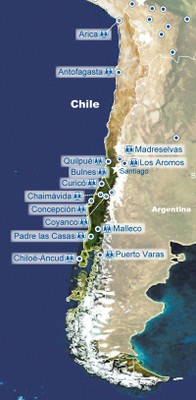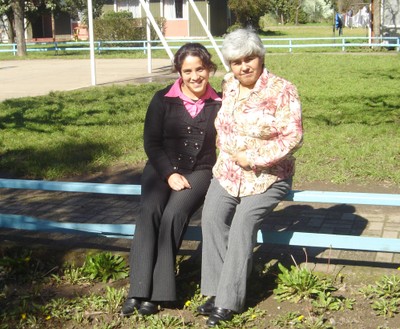Sponsor a child in Chile
Wealth distribution in Chile remains highly unequal and many Chileans live in shanty-towns with no access to running water or sanitation. SOS Children began working in Chile in 1965 to provide support for families unable to benefit from the country's economic progress.
To help a child in Chile, sponsor a child with SOS Children:
Sponsor a child in ChileUnequal wealth leads to widespread poverty
Children work on the streets and girls marry young
Our Work in Chile

Concepción-Chaimávida
The 2010 earthquake affected Concepción most severely. A shocking indicator of its severity is the fact that the tremors shifted the entire city 3 metres to the west. As well as destroying homes, shops and roads, the earthquake ruined people's livelihoods and Concepción became a city of looting, rioting, and lawlessness. The emergency relief we provided developed into self-sustainable development programmes run by the community. This has helped families in the area rebuild their livelihoods without having to move away, allowing children to grow up with stability and security.
Bulnes and Coyanco, Biobío
The 2010 earthquake had devastating effects in the region of Biobío. Animals died, harvests were destroyed and fires demolished thousands of hectares of forest. For many, migration was the only option. SOS Children provided emergency relief, ensuring families could stay where they were and begin to rebuild their lives. SOS Children has also been providing family support, education and medical care in the small city of Bulnes since 1969, and in Coyanco since 1975.
Curicó
Curicó was also severely affected by the 2010 earthquake, particularly in the coastal regions where tsunamis destroyed the city. SOS Children provided food, clothing and emotional support, helping families here to get back on track.
Malleco
Many people in Malleco commute to towns up to 60 miles away, leaving children home alone all day. Their parents away, many children spend much of their time on the streets, exposed to drugs and crime. SOS Children began working here in 1981 and provides day care, so that children are properly cared for while parents are away. Following the earthquake in 2010, SOS Children provided emergency relief and resources, helping create redevelopment programmes.
Madreselvas and Los Aromos, Santiago
The city of Santiago is divided, with many families living in severe poverty. Children as young as 5 contribute to the family income, missing out on school. Crime rates and drug abuse are high in these poor neighbourhoods. The first Santiago Children's Village was opened in Madreselvas, and the second in Los Aromos, both on the outskirts of the city. SOS Children supports families so that children can go to school instead of working, and therefore have a hope for a successful future.
Quilpué
Inequality is a big problem in Quilpué. Gender discrimination, poverty and malnutrition affect many. The work of SOS Children is vital in supporting children who are at risk of losing their family, or have nowhere else to live. There is still a lot of work to do to raise awareness of children's rights in the region.
Puerto Varas
The unequal wealth distribution means that many children in Puerto Varas cannot attend secondary school and many families are working in the informal sector with no job protection. In struggling families, children are required to earn money or neglected by parents who spend most of their lives working. SOS Children has been working here since 1984 to ensure children remain in the care of their families and benefit from the education they need for a successful future.
Antofagasta
The city of Antofagasta is rich and well-developed, but thousands of people living in shanty-towns on the outskirts of the city have yet to benefit from the area's collective wealth. Single mothers struggle to make enough money to support their family, and when families break apart, children are often left to fend for themselves on the streets. SOS Children established a village here in 1987, aiming to keep struggling families together.
Arica
The city of Arica is a popular tourist destination near the border with Peru and Bolivia. Chile's economic reputation encourages people to cross the border into Arica, only for dreams to be shattered. Living in makeshift camps, migrants often suffer from severe psychological problems. Proximity to the border means drug trafficking and child trafficking is widespread in the region. Young people in particular become addicted to drugs, leading to increased violence in a city already severely affected by crime. Children from struggling families are at risk of becoming entangled in crime and drug abuse, giving them little hope for the future. SOS Children began working here in 1988 and has been supporting vulnerable families to give children security and a positive future.
Ancud
Ancud is a town on the remote island of Chiloé, a dangerous ferry ride off the coast of Chile. People on the island rely on salmon fishing for a living, and in 2007 an economic crisis hit when a virus infected thousands of salmon. Such instability leads to alcoholism and domestic violence, leaving children vulnerable. SOS Children began working here in 2003 to care for children who were at risk of abandonment by their families.
Padre las Casas
Padre las Casas has one of the highest incidences of domestic violence in the country, with over half of all children suffering from abuse. The indigenous Mapuches people struggle to keep up in an ever-accelerating world, and many have fallen on desperate times. Drug addiction affects children from an increasingly early age. SOS Children began working here in 2008, helping families on the path to self-reliance.
Life in SOS Children's Villages Chile: My life in the village
This is the story of Viviana, a girl who was welcomed to SOS Children's Village Malleco, Chile, when she was just three years old. Several years have passed since then, but now, happily, she can say: "I am grateful for having been given the chance to grow up in such a wonderful place!"
I don't remember the time when I arrived in the village too well. I was so small that the only thing I clearly remember is that there were a lot of children around me, watching me with big smiles as if I were a present (She smiles). Much later I realized the presence of this great woman giving me loads of affection - my SOS mother.
My family was more than a normal family. My mother enjoyed keeping herself busy, although my brothers and sisters were also there to help her with the housework. My brothers, especially, were very naughty. My mother must have loved them too much to bear all the things they did to her. But my mother was brave and intelligent enough to cope with all of them. She was, and still is, a courageous woman.
In the village, children receive a lot of support, especially in education. It is not only our mothers or the village director who guide our development; also the other co-workers at the village. An "SOS aunt" (family helper), the caretaker or the driver is always there to offer a bit of support. I remember these co-workers as very nice people, ready to give me advice or comfort whenever I had a personal problem I was reluctant to share directly with my mum.
In the village, there was a time and place for everything. We had spaces to express our opinions, feelings, ideas, emotions, with the main objective of gaining self-confidence and security. It's impossible to remember how many of these activities I attended during my time in the village, there must have been hundreds of them.
So here I am. All the effort and support from the village community - including my own family - helped me to pursue a career and become a successful professional. I was lucky enough to find a job very soon after I graduated and am now a toddler's educator at a nursery school. I am an independent woman and have my own flat (well, a rented one for the moment).
I can see now, looking back, that there were lots of people in the village who helped me reach my goals. In a few words, I am grateful for having been given the chance to grow up in such a wonderful place. I was raised in a great family, by my mother, my brothers and my sisters.
Local Contact
Aldeas Infantiles SOS Chile
Av. Los Leones 382, 5° piso, Of 501
Casilla 16590
Correo 9
Santiago
Chile
Tel: +56/2/33 47 018, +56/2/33 47 019
Fax: +56/2/23 26 357
e-mail: aisos@aldeasinfantiles.cl

 Return to Schools Wikipedia Home page…
Return to Schools Wikipedia Home page…
